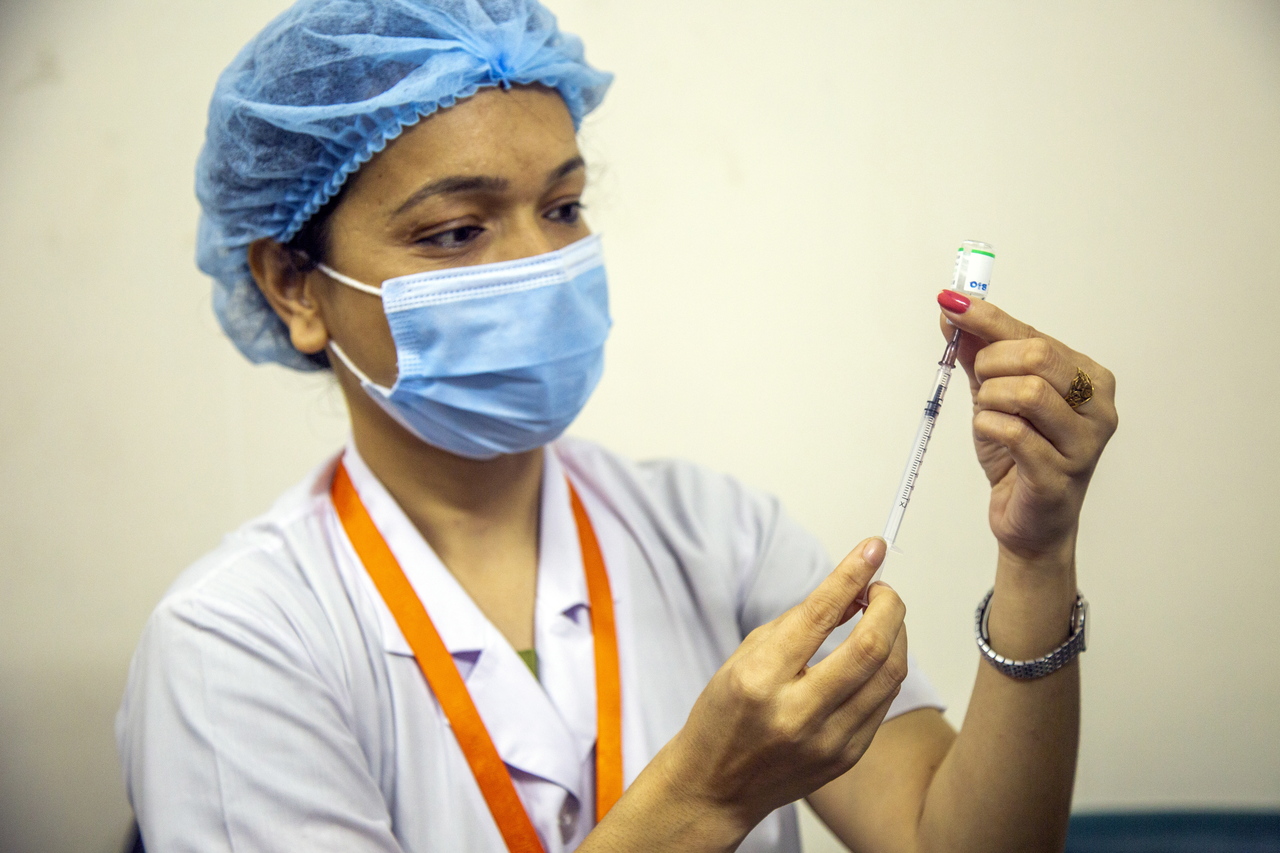India losing ground in its Covid-19 vaccine diplomacy plan in South Asia
Sign up now: Get insights on Asia's fast-moving developments

A health worker preparing a dose of the Sinopharm Covid-19 vaccine at Dhaka Medical College Hospital in Bangladesh on May 25, 2021.
PHOTO: EPA-EFE
NEW DELHI - With India scrambling to procure Covid-19 vaccines as infection numbers soar, neighbouring countries that relied on the South Asian giant for vaccines have increasingly turned to China.
Analysts said the move would give Beijing an opportunity to increase its presence in South Asia.
China has donated one million doses of vaccines - out of which 800,000 were delivered on Tuesday (June 1) - to Nepal.
It also gave 500,000 to Bangladesh, 200,000 to the Maldives, 550,000 to Bhutan and 1.1 million to Sri Lanka.
Bangladesh is also buying an additional 15 million doses from China.
India, whose Foreign Minister S. Jaishankar was in the United States recently to seek vaccines, has not expressed any intention of procuring Chinese vaccines amid a deterioration of ties over a border dispute that is slowly being resolved.
"The decision of countries in South Asia and India's neighbourhood to buy Chinese vaccines will increase Chinese footprint," said Professor Harsh Pant, director of studies at the Observer Research Foundation in New Delhi.
"And the Chinese generally give nothing for free. Clearly, I think more than financial demands, there will be political demands as we have seen with other sorts of help that China has provided to India's neighbours."
India rolled out an ambitious vaccine diplomacy at the start of the year.
In March, a top Indian diplomat told the United Nations General Assembly that India has supplied more Covid-19 vaccine doses globally than it has used to vaccinate its own people.
But then the second wave hit and the government had to prioritise domestic needs.
This has left nations such as Bangladesh, Nepal and Maldives in a dilemma.
Some, like Bhutan, which in April stunned the world by vaccinating 62 per cent of its population of 800,000 in 16 days, are now looking beyond India to continue its vaccination drive.
"India is a reliable friend and will give the second dose if asked, but given India's greater need to save lives, Bhutan should not pressure it," said Prime Minister Lotay Tshering in May.
The smaller neighbours, just like India, have been hit by a surge in infections.
Nepal has seen cases go up to 8,000 last month, with its health infrastructure under extreme stress.
It bought 2 million doses of the AstraZeneca vaccine from Serum Institute of India, but due to India's domestic needs, it has only received 1 million doses so far.
Nepal is also sourcing 100,000 doses of the Pfizer shot.
"Nepal had a hope that India would meet its vaccine requirements. That is why Nepal did not take many initiatives to purchase vaccines from other countries. Now, the Serum Institute of India has come up with a statement that it can export vaccines (only) by the end of this year," said journalist Kamal Dev Bhattarai, who added that India had "created goodwill" in Nepal with its vaccine diplomacy.
"As India itself is in crisis this time, I do not think there would be set back in neighbourhood policy. But it has provided space for China to increase its political influence."
But acquiring Chinese vaccines has not been without controversies.
Pricing has emerged as an issue as Indian vaccines cost between US$4 (S$5.30) and US$5 a dose. Chinese vaccines are double the price.
Maldives, reports said, was not looking at sourcing vaccines from China and was sourcing for AstraZeneca vaccine supplies.
In Sri Lanka, controversy even broke out over reports that it had bought Chinese vaccines at a higher cost than Bangladesh.
According to Sri Lanka's Daily Mirror newpaper, the country is paying US$15 a dose for the Sinopharm vaccine, which is US$5 higher than what Bangladesh paid.
The report was denied by the Sri Lankan government.
"Less developed countries are concerned about prices. This is where price sensitivity comes up," said Dr Srikanth Kondapalli, professor in Chinese Studies at Jawaharlal Nehru University.
Prof Pant said that it remained to be seen how and if the United States, Europe, Australia or Japan will step in to fill the vaccine void.
"A lot of the countries are not comfortable with Chinese vaccines and they want alternatives," he said.
"At a time of health crisis... India's neighbours are doing what any country would do under these circumstances."


